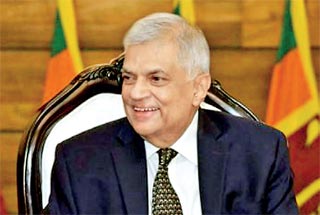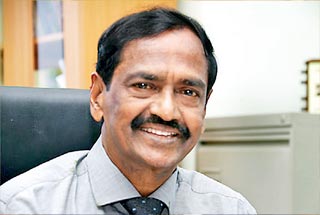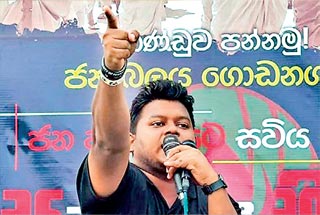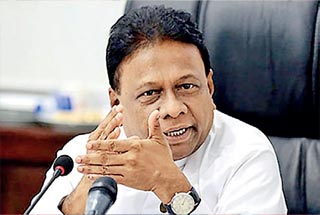Sunday Feb 22, 2026
Sunday Feb 22, 2026
Thursday, 12 January 2023 00:53 - - {{hitsCtrl.values.hits}}

President Ranil Wickremesinghe

Nimal Punchihewa

Wasantha Mudalige

Dullas Alahapperuma
|
 A President who sabotages an electoral process is like a CEO who sabotages a fire-alarm system in his factory.
A President who sabotages an electoral process is like a CEO who sabotages a fire-alarm system in his factory.
President Wickremesinghe was completely correct to condemn the invasion of the National Assembly in Brasilia. Invasion of a parliament and government buildings by a mob which refuses to recognise and respect the results of a presidential election (which has yielded a pro-people progressive president) and calls upon the military to intervene to restore the defeated rightwing president, is truly ‘neofascist’ as elected president Lula denounces it. However, the uprising of a people against an unelected president or ruler who has no popular mandate, subverts the holding of scheduled elections and heaps unfair burdens on the public is a classic democratic revolution along the lines of the French Revolution of 1789.
Ranil’s choice is simple: either hold the local government elections in March and take the political hit, or postpone the elections in the name of economic austerity and trigger an avalanche of protests which put paid to any chance of economic stability.
Punchihewa’s posture
Elections Commissioner Nimal Punchihewa’s Derana 360 performance on 9 January gives hope. Facing lawyer Sanka Amarajith’s interrogation he remained unruffled, dismantling the President’s insinuation that the EC was divided, and emphasising that all EC members signed all three gazette notifications about the election.
When a clip of State Minister Ranjith Siyambalapitiya was screened in which he says “if you wish we can set a world record by printing money during an economic crisis and holding an election”, Punchihewa pointedly responded: “I don’t know of any country in the world that went bankrupt by holding elections, but I do know of several that held elections and climbed out of economic crises.”
I was reassured to recognise in Punchihewa’s principled posture, the quiet, tie-clad, indispensable member in the 1980s of the PTA-battling panel of Human Rights lawyers of MIRJE, the Movement for Inter-Racial Justice and Equality (of which I was a founder-member in 1979).
A dying regime
With the UNP-SLPP alliance, Ranil and the Rajapaksas are locked in a deathly embrace. To borrow from Arthur Schlesinger Jr.’s famous critique of US policy in Vietnam, it is trapped in a many-sided box. It neither has the decency nor wisdom to hold the election, nor the power to obstruct or overturn it without hugely destabilising consequence. It can neither avoid an electoral humiliation, nor accept it as the chance for a drastic policy recalibration and/or smooth political evacuation, nor can it block the election without uncorking a large-scale social reaction which may sweep it away, nor ignore the result and carry on as it is doing now.
The President has only a lose-lose outcome. If the Supreme Court ruling greenlights elections on schedule, Ranil would have been seen to try to interrupt the electoral process and failed. If he somehow succeeds in derailing the election, discontent will spill into the streets, with the mainline democratic political parties, the SJB and JVP-JJB playing a role they didn’t during the Aragalaya, supplemented by the Aragalaya-inspired social movement which has revived due to high taxes, threatened electricity price hikes and the continued detention of Wasantha Mudalige. This is more so given the economic situation and scenario:
“Sri Lanka began a fresh austerity drive Monday, freezing Government recruitment as new taxes and higher electricity prices kicked in with authorities trying to secure an IMF bailout…The IMF has also asked Colombo to trim its 1.5 million strong public service, sharply raise taxes and sell off loss-making State enterprises.” (AFP)
In 1982, against the backdrop of a rapidly growing economy, an elected President decided that a scheduled election should be postponed, and that move inaugurated decades of civil wars. In 2023, against the backdrop of a rapidly shrinking economy, an unelected President is trying to impede or sabotage a scheduled election. One may extrapolate the probable outcome.
J.R. Jayewardene, the elected president and his party which postponed elections barely survived the civil wars because they passed the ball in the nick of time to his deputy, Prime Minister Premadasa and held an election. JR’s nephew Ranil, the unelected president, no longer has a Premadasa in his ranks to bail him out, but he does have one as an opponent. Logically, what is the likely outcome?
The regime’s mentality is illustrated by the remark of Namal Rajapaksa who led the ruling SLPP’s team in the handover of deposits for the local authorities’ election. He said it is his party’s responsibility to participate in the process “while it is the Government, the Cabinet, which will decide whether there is enough money to hold the election and whether it will be held”. He should have more respect for the Supreme Court as the ultimate arbiter.
The regime is not dying because there is a contradiction between President Ranil Wickremesinghe and the Rajapaksas. Any such contradiction is secondary to their collusion. It is precisely because the regime is dying that there is any such internal contradiction and not the other way around. The United Front government of 1970-77 saw a split between the SLFP and the LSSP in 1975 which was not the cause of that government’s demise but a symptom of it with the SLFP trying belatedly to dump the LSSP whose leader Dr. N.M. Perera was associated in the public mind with the policies which caused extreme economic hardship. The SLFP survived the 1977 wipeout; the LSSP-CPSL didn’t.
If there is a split between Wickremesinghe and the Rajapaksas and the latter dump the former, it will not be due mainly to the opportunistic utilitarian-genetic code of the Rajapaksa family but to the same reasons that caused Presidents Kumaratunga and Sirisena to throw out Wickremesinghe in 2003 and 2018 respectively when he was an elected Prime Minister. The reason is that the neoliberal economic and ethnic policies of Wickremesinghe were toxic to the centre-left nationalist vote-base of those two contrasting SLFP presidents. With Wickremesinghe, every game quickly turns zero-sum.
Ranil Wickremesinghe’s political history proves that on the rare occasions he finds himself in high office, he self-destructs politically by arrogant overreach. This abruptly terminated his administrations and finally destroyed his party. The second-oldest party in the country and the largest single party when Ranil assumed its leadership, the UNP cannot even contest a local authorities’ election today on its own or with smaller allies under its leadership, though its leader holds presidential office.
It is not the extrinsic Rajapaksa prop but the intrinsic drives of Ranil’s political behaviour that foredoom his presidency.
1970s endgames reloaded
The antagonism towards the Ranil-Rajapaksa regime of the university community as a totality—academics and students—is reminiscent of the campus communities’ mobilisation on the eve of the 1970 wipeout of the UNP-led 7-party coalition government of 1965-1970 cobbled together by President Wickremesinghe’s father, Esmond. That administration was hit by two university student upheavals in 1966 and 1969 in Colombo and Peradeniya involving violent clashes with the police and the army respectively. Today, the most educated segments of society, the professionals and the university academics, have turned collectively against the Ranil-Rajapaksa regime. No ruler can survive the concentrated antipathy of the educated elite.
As late as 1976, the Sirimavo regime toyed with the non-holding of elections due in 1977, having already extended its term of office in 1975 by two years on the specious grounds that its five-year term of office which commenced in 1970 should actually be counted from the date of the promulgation of the 1972 Constitution. In fact, an election in 1975 would not have smashed the SLFP as did the one in 1977.
In 1976, Ministers T.B. Ilangaratna and D.M. Jayaratne declared on public platforms that Sri Lanka in the person of Prime Minister Sirimavo Bandaranaike having been elected the chair of the Non-Aligned Movement, “representing two-thirds of the world” for a period of three years, her domestic term of office should be extended to cover that three-year period. Responding with wicked wit, R. Premadasa untranslatably lampooned her as “leader of two of the three”.
Dramatic and credible as this was, the United Front Government which enjoyed a two-thirds majority in parliament, did not stop conspiring, still less end, because of it. It ended under the sudden onslaught of students and workers at the tail-end of 1976 after the death by Police shooting of freshman undergraduate Weerasooriya from the village of Uhumiya. The nationwide student rebellion ignited by the university students who went back to their old schools and motivated the students to hit the streets.
“The strike spread into schools and colleges. High school students walked out. In Colombo youngsters from 8 to 18 wrote slogans against the Government and stopped traffic in the city’s streets.” (Leadership in Sri Lanka Shaken By Outbreak of Student Protests - The New York Times (nytimes.com)
The student revolt caused the Communist party to rebel in parliament and ended the two-thirds majority of the government which was required for any attempt at extending the life of the Sirimavo administration.
“…Politically, the ruling party had already lost considerable ground. Mrs. Bandaranaike’s party has 96 seats in the I57‐seat National Assembly. The Communist Party, which has seven seats, may withdraw from the coalition if the students’ resentment against the Government continues. “We have our main support among the students,” a Communist leader said. “It is important we respect their sentiments.” (NYT, December 15, 1976, Page 14)
The student struggle was supported by the Opposition. Imtiaz Bakeer Markar who headed the UNP’s student wing at the time, remembers that the party’s deputy leader R. Premadasa assisted and encouraged the student upsurge ignoring the cautioning of J.R. Jayewardene.
“…The general resentment of the student community against the authorities has been seized by opposition parties, with elections just five months away.” (NYT, ibid)
The student’s revolt converged with a railway workers strike led by an independent (non-party) trade union, the Dumriya Seva Ekamuthu Sangamaya led by worker-militants such as Olwyn Ratnapala who were veterans of the August 1953 Hartal. This quickly escalated into a General Strike.
Shocked by what was being discussed about the postponement of elections at the dining table at Rosemead Place, Prime Minister Bandaranaike’s radical son-in-law, LSE educated sociologist Kumar Rupesinghe excused himself, rushed to the office of his Maoist caucus, stopped the presses which were printing the latest issue of its newspaper ‘Janavegaya’ and wrote a headline which blew the whistle on the discussion to cling to power. He also called on his old foe the Leader of the Opposition and UNP, J.R. Jayewardene, and briefed him on the plot. It cost him his marriage.
J.R. Jayewardene and R. Premadasa then made the public threat that in the event of any such effort to postpone elections, the Opposition would engage in a ceaseless, escalating island-wide campaign of non-violent civil disobedience.
When summoned for consultation, Army commander Sepala Attygalle informed Prime Minister Sirimavo Bandaranaike that in the event of a postponement of elections and resultant civil disobedience by the Opposition, he could not guarantee the loyalty of the Army to the incumbent administration.
Thus, it was the November-December 1976 ‘aragalaya’ of the student-worker alliance that saved democracy, opening the fissure for the mainstream Opposition to pour through and the citizen-voter to smash the family-centric SLFP rule while decimating its arrogant ex-partners of the Old Left in the landslide of 1977.
I should know: firstly, as the country’s leading editor and journalist my father was in the loop; secondly, the student who was killed in November 1976 was my freshman ‘batchmate’ in the Arts faculty at Peradeniya University. I recall encountering Prof. Saroj Jayasinghe, then a medical student, when I was among the undergrads who had come down from Peradeniya and were moving from academic institution to institution mobilising students to join the struggle on the streets. I was also a member of the Lanka Samaaja Adhyana Kavaya (Lanka Social Studies Circle) a radical group which had close links with the trade union leading the railway strike which sparked the General Strike.
The November-December 1976 scenario could be replayed in Sri Lanka in 2023.
|
SLPP’s Karuna rebellion
When the Sirima Bandaranaike regime cracked open in 1976, it was not only because the Communist party quit. The SLFP fissured too. Influential SLFP parliamentarians T.B. Subasinghe, Nanda Ellawela, Tennyson Edirisooriya and A.M. Jinadasa split off to form the People Democratic Party (PDP).
The SLPP was the product of an intra-SLFP rebellion against the partnership with Ranil’s UNP. Now, the same SLPP has entered an electoral union with the Ranil-led UNP.
When the first UNP-SLFP hybrid administration came into being in 2015, the resistance came from a motley band of rebels called the Joint Opposition (JO). They organised the Nugegoda rally of February 2015. Most of them, except Prime Minister Dinesh Gunawardena, remain opposed to alignment with Ranil’s UNP. In 2018, they were joined by the Sirisena-led SLFP which had ruptured with Ranil.
Today, the bulk of the old Joint Opposition (JO), together with the SLFP, have formed a new front pitted against the Ranil-Rajapaksa axis created by their old leader Mahinda Rajapaksa.
The constant in this kaleidoscope is the ideological antipathy of the ‘patriotic centre-left’, i.e., progressive populists, to the policies and leadership of Ranil Wickremesinghe.
Ex-President Sirisena’s SLFP, Dullas’ FPC, the SLMP, Anura Yapa’s faction, and Weerawansa’s ULS will contest the local government election as the Freedom People’s Front, with Sirisena, Dullas, DEW, Anura Yapa and Wimal as the Leadership Council. The new Front accounts for 42 MPs. This new factor is going to slice into the vote-bases of the ruling SLPP. The Rajapaksas’ ruling party faces the equivalent of the Karuna-Pillaiyan rebellion.
Wasantha: People’s warrior
The way that Wasantha Mudalige is being treated is not merely outrageously, infuriatingly unjust and unfair, it is plain dumb in a manner that only a combination of Ranil Wickremesinghe and the Rajapaksas can manage to be.
The conduct of the state, with the authorities presenting charge after charge so as to prevent or delay his release even on bail, reveals far nastier things about the nature of the regime than it does about Wasantha Mudalige.
If there was a single credible piece of evidence that tied him to violence—and I don’t mean forcefully shaking a barricade—let alone terrorism, he would have been charged by now and a trial would have been underway giving him his day in court. That has not happened.
Ask Mavai Senathirajah and Vardarajahperumal about the incarceration of the Tamil youth who simply hoisted black flags against the promulgation of the Republican Constitution of 1972 with its discriminatory clauses. They were among those unknown young detainees. Detention only hardens resolve.
The prolonged detention of youth activists who engaged in non-violent civil disobedience lent weight to the argument of a young Prabhakaran in the same year (1972) that such methods of struggle were useless against a repressive state and that lethal armed action was the only language the state would understand.